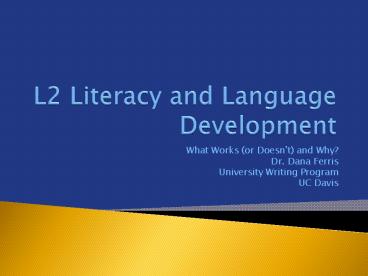L2 Literacy and Language Development - PowerPoint PPT Presentation
1 / 26
Title:
L2 Literacy and Language Development
Description:
An increasingly complex student audience in California. Changing ... Developing effective text-previewing strategies. Analyzing unfamiliar vocabulary in context ... – PowerPoint PPT presentation
Number of Views:26
Avg rating:3.0/5.0
Title: L2 Literacy and Language Development
1
L2 Literacy and Language Development
- What Works (or Doesn't) and Why?
- Dr. Dana Ferris
- University Writing Program
- UC Davis
2
The Question What Works?
3
Another Question Works for Whom?
- An increasingly complex student audience in
California - Changing/differing needs
4
George the Pre-Med
- Born in the U.S. to immigrant parents from China
- Moved back to China at 9 mos. Old
- Returned to the U.S. at age six
- Did not learn English until age six
- Speaks Chinese fluently but does not read or
write it - No accent or comprehension problems, no major
ESL issues in his writing - Junior at UCD, Bio-Sci major
- Took remedial (Subject A) course three times
- Highly motivated
5
George the Pre-Med Reflections
- I believe my essay is strong and supportive but
there is a weakness. The weakness of the essay is
the lack of a stronger vocabulary, which is
directly connected to me. I understand that I
have to improve my vocabulary for the essay to
have higher diction.
6
10 Extensive Reading Programs
- What Works Thoughtfully designed and
implemented extensive reading components in
reading/writing courses - What Doesnt Work Exposing students only to
short bits of text - But
7
9 Intentional Vocabulary Development
- What Works Thoughtfully designed vocabulary
instruction - What Doesnt Ignoring vocabulary and assuming
it develops by itself - But
8
9 Enlightened Vocabulary Instruction
- Uses research-based word lists to select common
and useful words for students to study (see
www.lextutor.ca) - Encourages student-directed vocabulary learning
(e.g., cards and logs) - Teaches strategies for vocabulary analysis and
learning - Understands the critical contribution of
extensive reading
9
(No Transcript)
10
8 Effective Text Selection
- What Works Exposing students to academic
texts - What Doesnt Picking texts just because they
are fun or engaging - But
11
7 Developing Strategic Readers
- What Works Creating a list of strategic goals
for a group of students (see next slide) - What Doesnt Having students just do exercises
- But
12
7 Sample List of Goals
- Developing effective text-previewing strategies
- Analyzing unfamiliar vocabulary in context
- Using graphic organizers to outline important
text content
13
6 Innovative Assessment
- What Works Personalized, creative approaches to
assessing reading and writing - What Doesnt Rigid, adversarial objective tests
and make-or-break timed writing exams - But
14
5 Peer Response to Writing
- What Works Carefully designed approaches to
peer feedback (see next slide) - What Doesnt Vague or haphazard approaches to
peer feedback (see slide) - But
15
5 Carefully Designed Peer Feedback
- Training
- Stable, thoughtfully formed groups
- Consistent use
- Carefully structured tasks
- Teacher facilitation and supervision
- Accountability
16
5 Vague and Haphazard Peer Feedback
- Is not utilized consistently, so students dont
develop their skills - Is loosely structured and unsupervised
- Is not taken seriously as part of the writing
process
17
4 Teacher Feedback
- What Works Thoughtful teacher commentary on
evolving writing projects - What Doesnt Rubber-stamped, unclear,
overwhelming, or overly harsh responses - But
18
3 Grammar Instruction
- What Works Clearly focused minilessons on
self-editing strategies with direct application
to students own writing - What Doesnt Lots of decontextualized grammar
instruction in a writing class - But
19
3Principles for Effective Grammar Minilessons
- Focuses on issues relevant to writing
- Focuses on teachable and learnable rules
- Based on careful analysis of class needs
- Includes immediate application to students own
writing
20
2 Written Corrective Feedback
- What Works targeted feedback, indirect
feedback, required revision, tracking progress - What Doesnt comprehensive direct feedback on
final drafts, no follow-up - What Also Doesnt Work Ignoring or neglecting
error/accuracy issues and hoping they will just
disappear over time - But
21
ANDdrum roll
22
1 Teacher Collaboration
- What Works Collaboration and cooperation
between ESL teachers and other English/writing
instructors at their institutions - What Doesnt Isolation, separation, and having
chips on our shoulders - But
23
Someone who doesnt get it
- I understand that the needs of an ESL student
differ from native speakers but the courses, on a
college- and district-level, are designed for
certain levels of language fluency that the
students need to meet. I will provide feedback
that helps them see how parts of English fit with
their native language, but the ESL department is
mainly responsible for those skills.
24
What Really Doesnt Work
- Business as Usual
25
Retooling
- Understand the new L2 student audiences and
their needs. - Understand the way literacy practices have
changed in general. - Understand the academic and political climate we
live and work in.
26
Retooling
- Understand the potential and risks of technology.
- Understand the concerns and assumptions of our
English/writing colleagues and colleagues in
other disciplines. - Understand ways we can enter and change the
conversation about L2 students in our own
contextsand understand entrenched attitudes and
biases that may take time to change.































